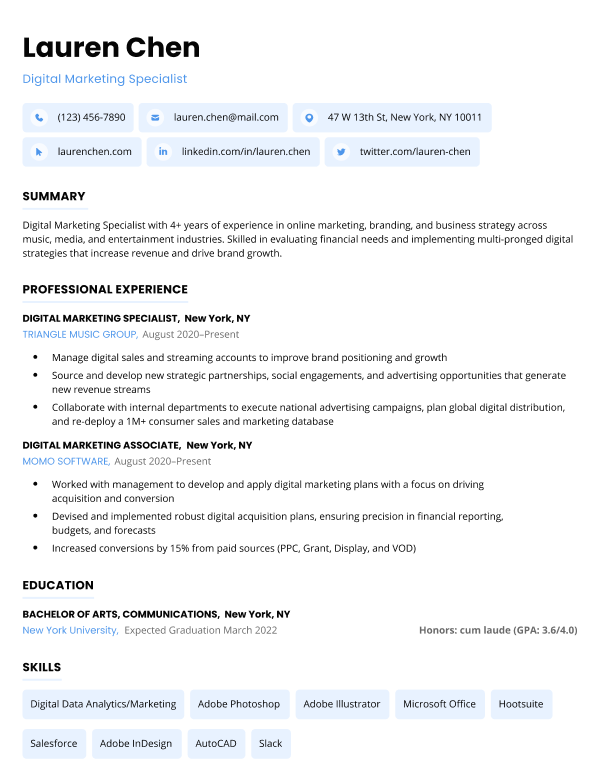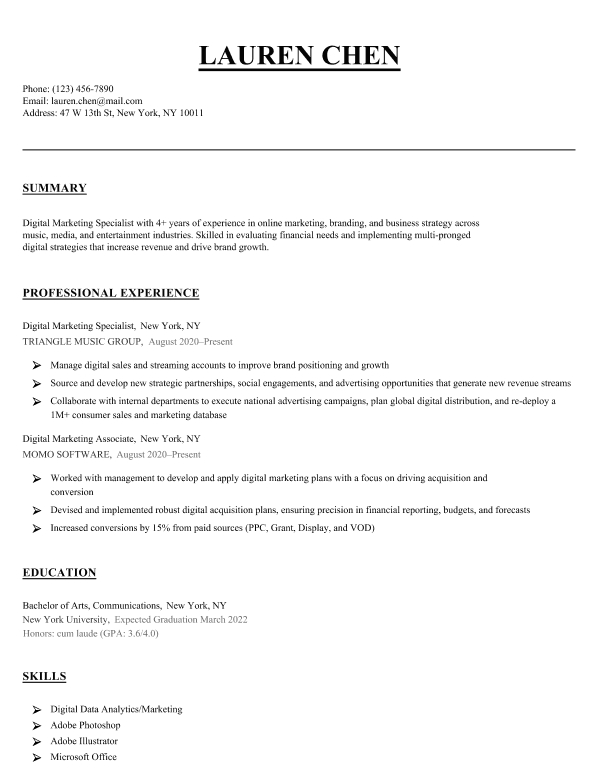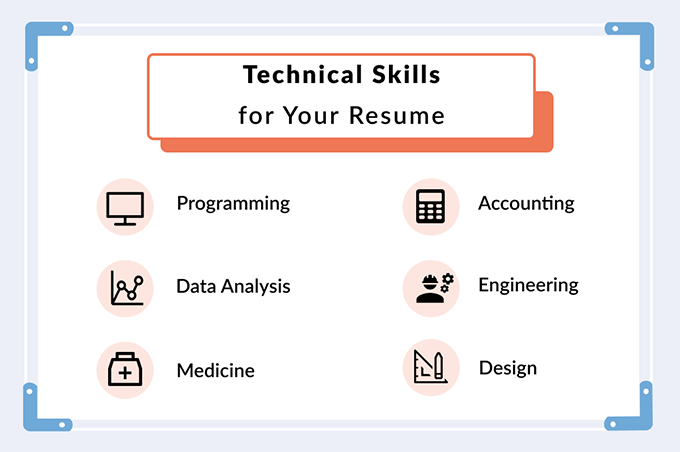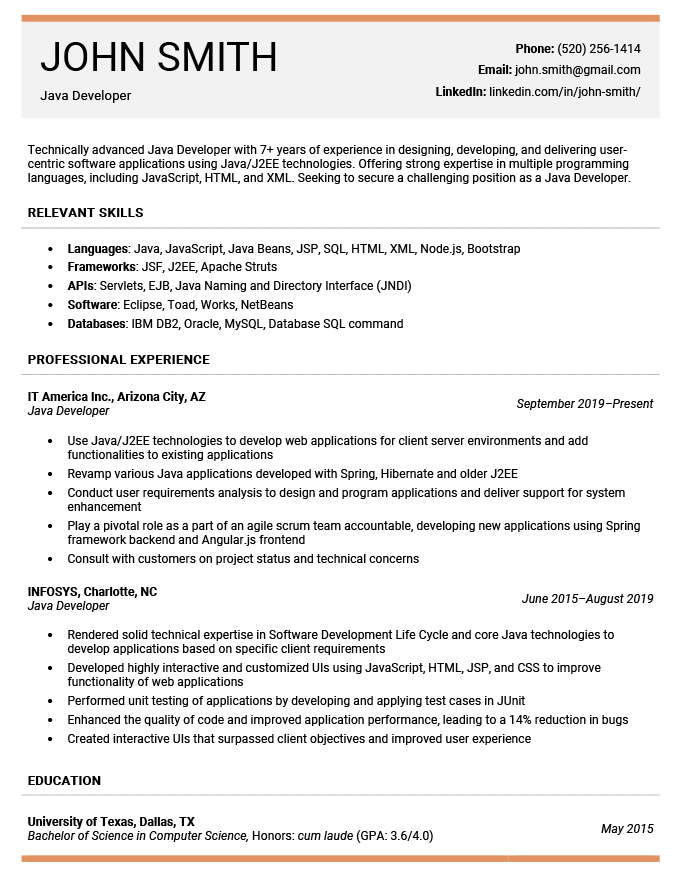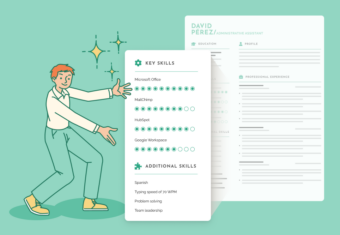What are technical skills?
Technical skills are hard skills you learn so that you can do work that involves science, technology, engineering, and math (STEM). Even if you don’t work in a STEM-related field, you need some basic technical skills on your resume to get the job you want.
- Computer skills
- Social media skills
- Financial literacy
- Internet safety
- Basic math
- Typing skills (or voice-to-text technology)
- Cloud collaboration (shared calendars)
- Remote communication (Zoom, email)
When you put technical skills on your resume, sometimes a simple list in your skills section is enough. However, you should also describe your abilities in greater detail in your work experience section.
Read on to find technical skills examples for specific jobs, learn more about how to list technical skills on your resume, view a resume example with technical skills, and discover answers to common questions about technical skills.
Our free-to-use resume builder can make you a resume in as little as 5 minutes. Just pick the template you want, and our software will format everything for you.
Technical Skills Examples for Your Resume
Relevant technical skills are some of the best skills to list on your resume because they’re valuable to employers. But the technical abilities employers are looking for will vary depending on your work.
Here are some of the top technical skills that employers are looking for in 2024 if you work in:
- project management
- engineering
- healthcare
- accounting
- business & data analysis
- marketing
- information technology
- finance
- education
- graphic design
1. Project Management
Your project management skills show employers that you can handle leading a team. Some of the technical skills employers look for when hiring managers are:
- Scrum and Agile proficiency
- Technical reporting
- Work scheduling software
- Information technology
- Data analytics
- Kanban
- Productivity software (Trello, Todoist)
2. Engineering
Engineering is a diverse field, so the technical skills you’ll need vary depending on your particular expertise. Desirable engineering skills include the following:
- Computer science fundamentals
- CAD software
- Data modeling
- System design
- Statistics and probability
- MATLAB
- Visual Basic
- Trimble SketchUp Pro
Don’t forget that in addition to these basics, you’ll need to showcase the knowledge and abilities specific to your engineering field.
3. Healthcare
Whether you’re a nurse, doctor, or medical coder, you’ll need many technical skills to provide quality healthcare. Here are some key technical skills for the field of medicine:
- Advanced lifesaving training (ACLS)
- Diabetic care and wound monitoring
- Phlebotomy
- Dialysis
- Traction management
- Medical software
- Telemedicine
- Medical administration
4. Accounting
The accounting skills necessary for a job depend on whether you work in a small to mid-sized business, for your state or national government, or as a corporate accountant.
Here are some of the most popular accounting skills regardless of your desired accounting position:
- Intuit QuickBooks
- Sage 50 Accounting
- Intrax ProcedureNet
- Microsoft Dynamics
- SAP
- ERP systems
- Cost and trend analysis
- GAAP and FASB knowledge
- Auditing
5. Business & data analysis
Every major company needs experienced business and data analysts to help them make decisions. That’s why business analysis is one of the top technical skills in today’s job market.
These business and data analysis skills are some of the most popular to highlight on your resume:
- Amazon Web Services (AWS) software
- Advanced math skills
- Microsoft Access & Excel
- Oracle JDBC
- Transact-SQL
- Eclipse IDE
- Apache Spark
- C#
- Python
- Ruby
- Data modeling
- BI tools and applications
- Machine learning analytics
- Statistics
Not sure what the difference is between a technical and soft skill? Understanding hard skills vs soft skills can help you create a more well-rounded resume.
6. Marketing
Marketing covers a wide range of work aimed at attracting customers and increasing sales.
Marketing roles tend to emphasize soft skills, but there are some technical marketing skills that can set you apart from other candidates in the eyes of potential employers, such as:
- website design
- content development
- digital advertising
- mobile marketing
- social marketing
- SEO/SEM
- Google Analytics
- customer relationship management (CRM) systems
7. Information technology
Almost all hard skills in the information technology field are technical skills.
Here are some in-demand skills to put on your IT resume:
8. Finance
Are you writing a financial analyst resume or applying for an investment banking job? Below are examples of financial technical skills to list on your resume:
- FinTools XL
- Capital IQ Pro
- LexisNexis
- Accounting software
- Federal Trade Commission (FTC) compliance
- Market forecasting tools
- Risk assessment
9. Education
Technology plays a big role in the modern classroom. Here are some of the technical skills educators are expected to have:
- Hybrid & distance learning technology
- Blackboard Learn
- Microsoft PowerPoint
- Google Classroom
- Smart whiteboards
- Educational apps
10. Graphic Design
Graphic design skills include many technical abilities. These are some of those abilities employers are likely looking for on your graphic design resume:
- Photoshop, Illustrator, and InDesign
- HTML
- UI/UX
- Print design and typography
- Branding
- AI design tools
How to list technical skills on your resume
Abilities most relevant to your target position should be featured throughout your resume so a hiring manager can quickly scan and assess them. Expertly emphasizing your technical skills can get you onto the shortlist for the position you want.
Here’s how to showcase key technical skills on your resume in:
Put your most relevant skills in your resume summary
The first part of your resume that hiring managers read is your resume summary — a 2–4 sentence highlight reel of your most impressive skills and qualifications. So if you have the technical skills they’re looking for, include them in this section to grab their attention right away and keep them reading the rest of your resume.
Here’s an example of a well-written resume summary that emphasizes the candidate’s technical skills:

Create a dedicated technical skills section
If the job description heavily emphasizes technical skills, then put yours in a technical skills section at the top of your resume, just below your introduction. Format this section as a bulleted list to make it easy to read.
To make your skills stand out even more, you can use a visual element that communicates skill levels on your resume.
Additionally, if you have an extensive roster of technical skills, you can set each bullet as a category—then, list specifics. For example, if you’re an accountant, you could list your technical skills this way:
- Accounting applications: Peachtree, QuickBooks, FreshBooks
- Payroll applications: Paychex, Sage HRMS, ADP, Ascentis
- ERP: SAP R/3, PeopleSoft, Oracle Financials
- BI applications: Crystal Reports, Domo, InsightSquared, IBM Cognos
- Core competencies: Corporate, cost and tax accounting, GAAP, risk management
And here’s an example of what a technical skills list looks like on an SQL developer’s resume:
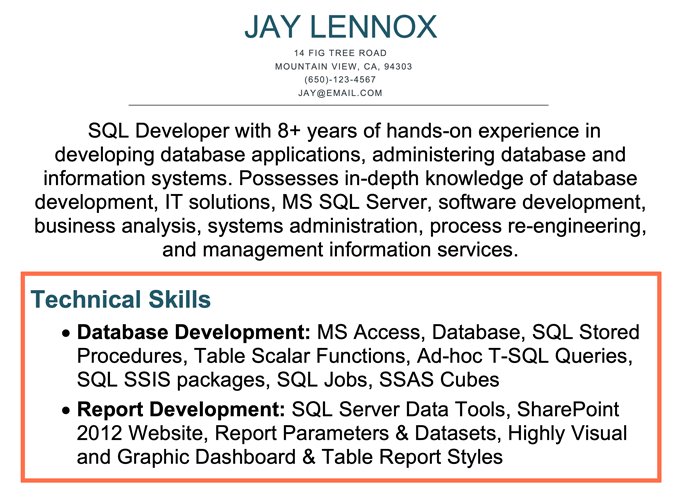
Demonstrate your technical skills in your work experience bullets
You should also prove your abilities throughout your resume’s work experience section.
By creating bullet points that describe your professional accomplishments on your resume, you can show how you used your technical skills to benefit your previous or current employer.
For instance, if you’re an accountant you could mention how you used enterprise resource planning (ERP) and accounting applications to reduce inefficient spending. This reinforces how and when you used specific technical skills.
Here’s an example of a resume work experience section that includes technical skills throughout:
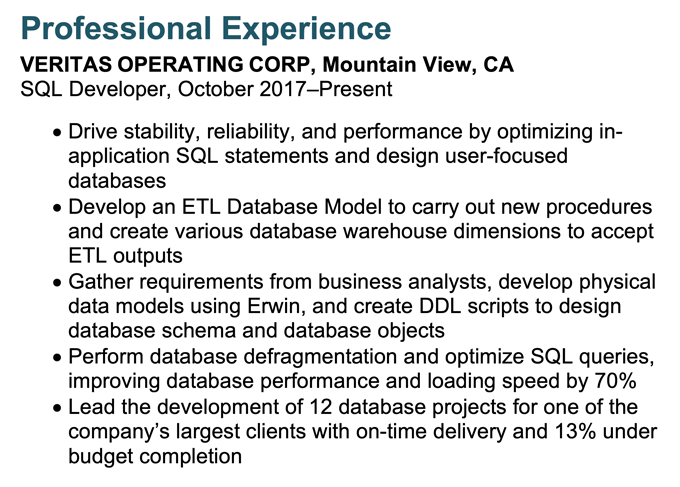
In addition to your resume, it’s a good idea to add technical skills to your LinkedIn so you’ll connect with recruiters looking for those skills more easily.
Technical Skills on a Resume Example
Below is a resume example that follows a chronological resume format with the difference that the skills section is placed at the top. This ensures hiring managers will clearly see the candidate’s technical skills when picking up their resume. You can download this resume as a Word document or copy and paste the text format into your preferred word processor to use as templates for your own resume:
Resume example with technical skills (text format)
SUMMARY
Technically advanced Java Developer with 7+ years of experience in designing, developing, and delivering user-centric software applications using Java/J2EE technologies. Offering strong expertise in multiple programming languages, including JavaScript, HTML, and XML. Seeking to secure a challenging position as a Java Developer.
SKILLS
- Languages: Java, JavaScript, Java Beans, JSP, SQL, HTML, XML, Node.js, Bootstrap
- Frameworks: JSF, J2EE, Apache Struts
- APIs: Servlets, EJB, Java Naming and Directory Interface (JNDI)
- Software: Eclipse, Toad, Works, NetBeans
- Databases: IBM DB2, Oracle, MySQL, Database SQL command
PROFESSIONAL EXPERIENCE
IT AMERICA INC., Arizona City, AZ
Java Developer, September 2019 – Present
- Use Java/J2EE technologies to develop web applications for client server environments and add functionalities to existing applications.
- Revamp various Java applications developed with Spring, Hibernate and older J2EE.
- Conduct user requirements analysis to design and program applications and deliver support for system enhancement.
- Play a pivotal role as a part of an agile scrum team accountable, developing new applications using Spring framework backend and Angular.js frontend.
- Consult with customers on project status and technical concerns.
INFOSYS, Charlotte, NC
Java Developer, June 2015 – August 2019
- Rendered solid technical expertise in Software Development Life Cycle and core Java technologies to develop applications based on specific client requirements.
- Developed highly interactive and customized UIs using JavaScript, HTML, JSP, and CSS to improve functionality of web applications.
- Performed unit testing of applications by developing and applying test cases in JUnit.
- Enhanced the quality of code and improved application performance, leading to a 14% reduction in bugs.
- Created interactive UIs that surpassed client objectives and improved user experience.
EDUCATION
University of Texas, Dallas, TX
Bachelor of Science in Computer Science, May 2015
Honors: cum laude (GPA: 3.6/4.0)
Answers to common questions about technical skills
Below we’ve answered four of the most frequently asked technical skills questions, including:
- How to say tech savvy on a resume?
- What technical skills should I put on my resume?
- How do I improve my technical skills?
- Why are technical skills important?
How to say “tech savvy” on a resume?
Don’t say “tech savvy” on a resume. The term is cliche and vague.
Instead, quantify your technical skills by providing examples of how you’ve used them to produce results. Include hard numbers to back up those results whenever possible.
Here are two examples of an opening sentence of a marketing coordinator’s resume summary. The first example just uses the term “tech savvy” and makes the applicant appear inexperienced. The second example provides descriptive examples of the applicant’s technical prowess:
Vague example
Tech savvy marketing coordinator with 3 years of experience building brand awareness and loyalty among diverse target audiences.
Descriptive example
Results-oriented marketing coordinator with 3 years of experience using CRM, data analytics, and SEO expertise to build brand awareness and loyalty among diverse target audiences.
What technical skills should I put on my resume?
You should put the technical skills listed in the requirements for your target job on your resume. Let’s say you’re applying for a restaurant position, and the job ad says:
“Seeking an individual with experience using Toast Point of Sale (POS)”
If you have experience with the specified POS, say so on your resume. Here’s an example of how to highlight that technical skill in your resume summary:
Exuberant waiter with 4 years’ experience providing engaging service, upselling menu items, and managing cash and credit card transactions with Toast POS.
How do I improve my technical skills?
Here’s how you can improve your technical skills:
- Take courses at a local college or an online platform like edX
- Watch YouTube tutorials and read technical blogs
- Attend workshops
- Join groups dedicated to the technical skills you want to improve
Why are technical skills important?
Technical skills are important because the number of jobs that only require little or no technical ability is rapidly decreasing.
Even if you’re a blue-collar worker, you need to be able to operate a computer, browse the internet, and be comfortable learning new systems for human resources (e.g., accessing medical benefits) or tracking projects.
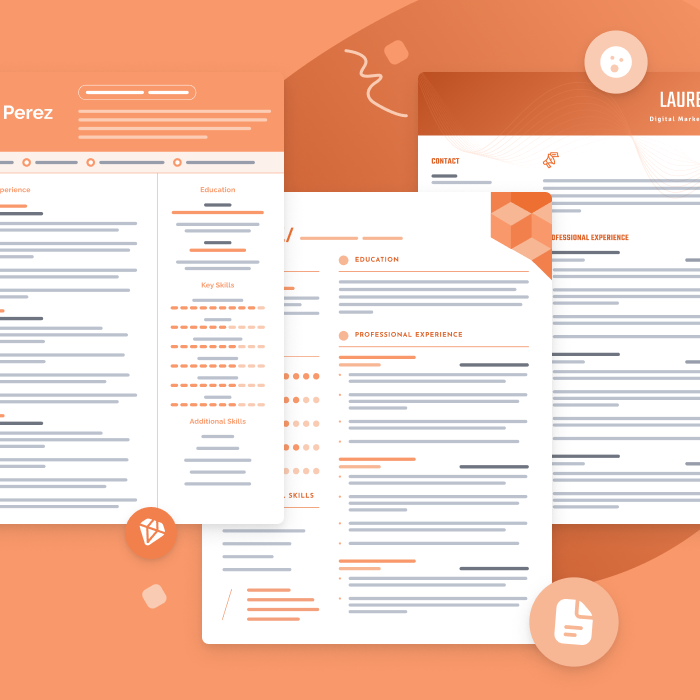
The best resume templates for 2024
One of the best ways to make your resume is by filling out one of our free resume templates. All our templates are designed by experts and free to download for Microsoft Word or Google Docs.
Additional skills-related resources
Here are more skills-related resources to help you write your resume.
Click to rate this article
4.1 Average rating



